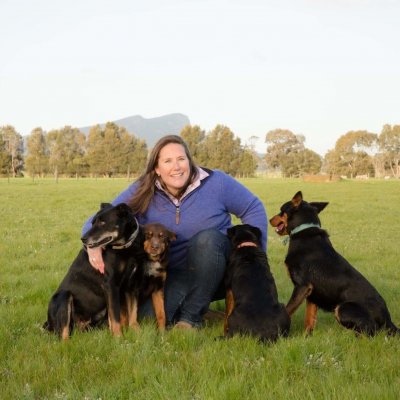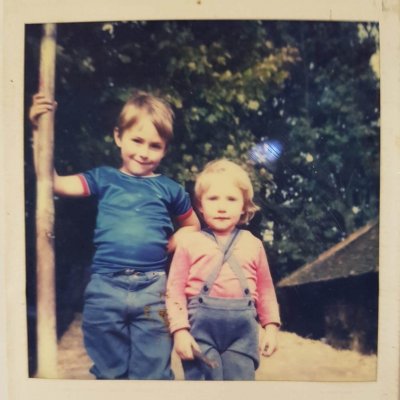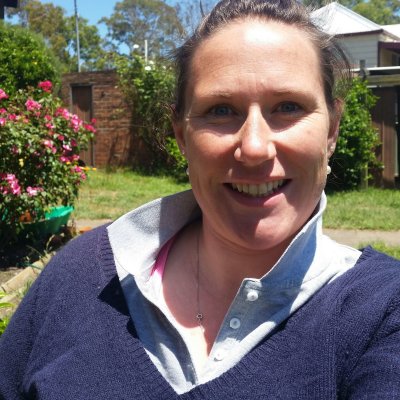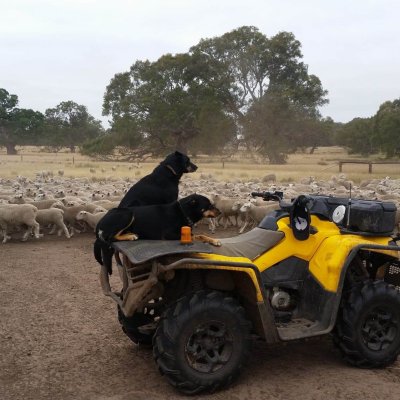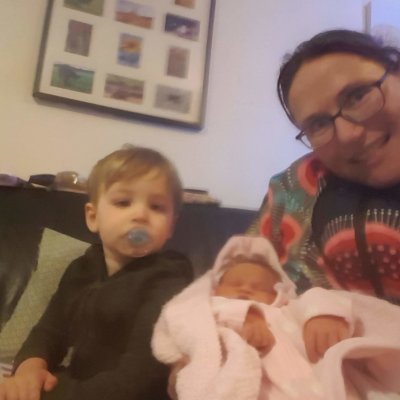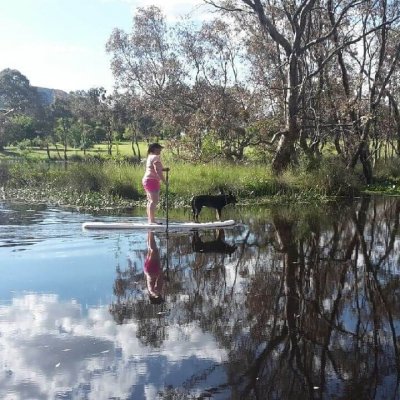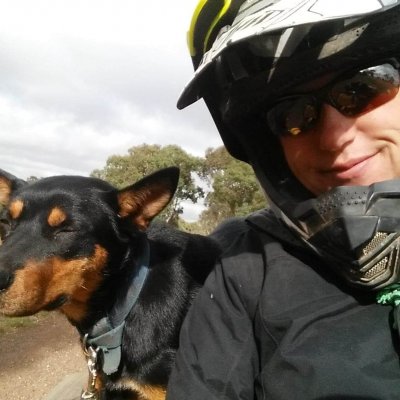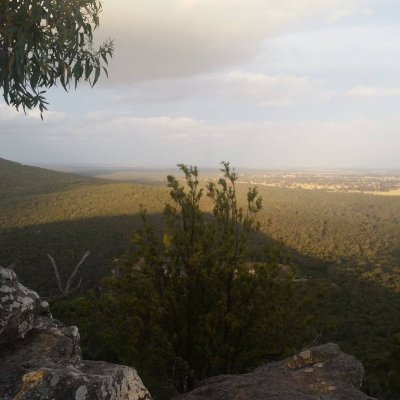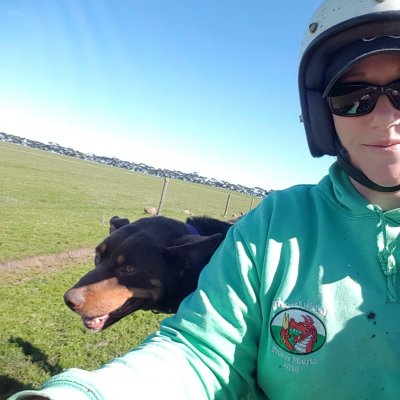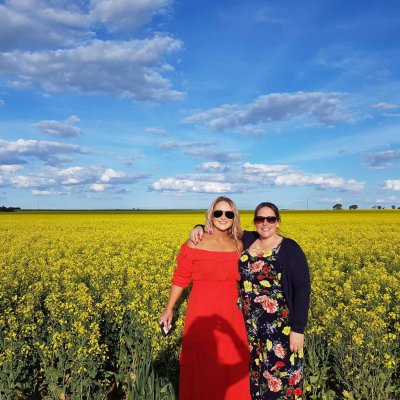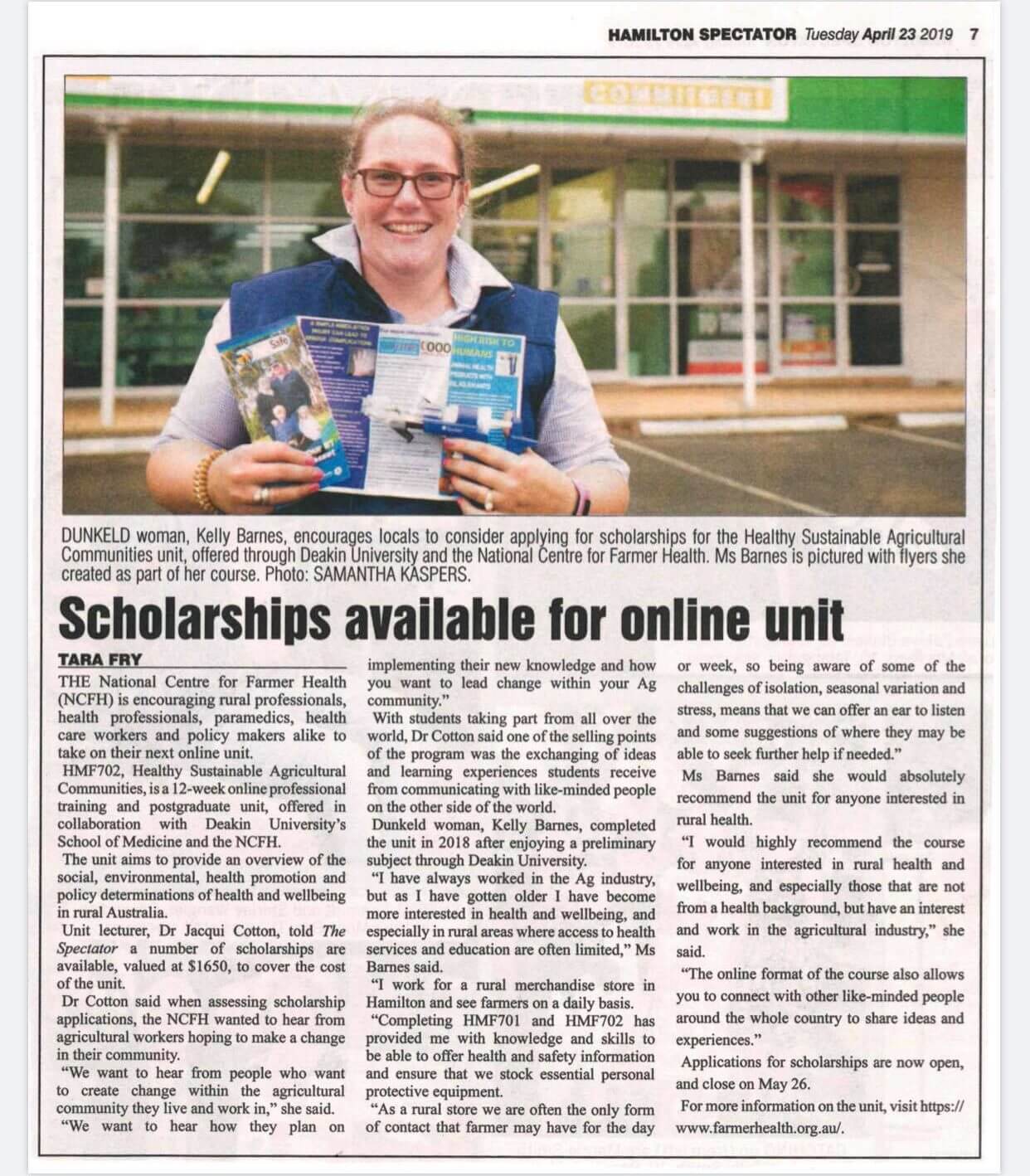Originally from a small family farm in the South of England, Kelly Barnes has since forged a life in the Southern Grampians town of Dunkeld, Victoria. Seldom without the company of her two kelpies, Kelly is an active member of the Dunkeld and District Country Women’s Association and is passionate about the health, safety and well-being of those in rural communities. Kelly recently completed tertiary education in agricultural health, medicine and sustainable communities and showcased her remarkable story of resilience via the National Centre for Farmer Health’s Digital Storytelling Workshops. To view Kelly’s story, please click here.
When asked what concerned Kelly about the health and safety of those in rural industries and communities, Kelly highlighted the mental health of those consistently working long hours and seldom getting away from the farm. She also identified the various risks associated with hand-feeding, and the necessity to “always use a safety vaccinator when using oil-based vaccines” in order to avoid the likelihood of needle-stick injuries. Kelly’s advice to other rural women is simple – back yourself, be persistent and don’t underestimate your ability to enable life-saving change. She also acknowledged the power in one person’s capacity to affect a large scale cultural shift by setting a good example for others.
How would you describe yourself in three words?
Passionate, careful and thoughtful.
Tell me something interesting about yourself...
I grew up on a small family farm in the South of England and I have been living in Dunkeld, Victoria since 2011.
I have two kelpies who I love to bits and have been so much more to me than just working dogs.
I am an active member and the 2019-2021 Co-President of the young and vibrant Dunkeld and District Country Women’s Association.
I like to go paddle-boarding and kayaking when the weather is nice and I also enjoy listening to audiobooks and drinking good coffee!
What's one achievement you are most proud of?
I am most proud of being strong enough to follow my dreams and make Australia home, despite the ups and downs that come with living the other side of the world, away from my family and UK friends.
What makes you truly happy?
I am truly happy when I am relaxing and chatting with great friends and family, including my adorable nephew and niece, and no family would be complete without a dog or two to hang out with.
What do you love the most about being a rural woman?
I love the open space and fresh air of the country and I admire the strength and resilience of rural communities.
Rural women are faced with many challenges, but they also have great opportunities to run their own businesses and really make a difference to those around them. Rural women rally together in times of need and really show the true definition of it taking a village to raise a family.
Tell me about a time when you felt worried about your own or someone else’s health, safety or wellbeing on the farm, boat or in some other aspect of rural life.
Oh so many times!!
Constantly working long hours and weekends, often alone, and not taking time out to get off the farm and unwind can affect mental wellbeing. The unpredictable nature of farming and the weather can make decision making difficult and can often lead to many hours spent lying awake at night second-guessing decisions. Tired and distracted farmers can take unnecessary risks.
Running alongside a moving ute and trail feeder, pulling the slide to feed out grain, or leaving the ute in a low gear and hopping on the back to throw out hay – a recipe for disaster!
Loading up the 4-wheeler with sheep you’ve picked up along the way, or those bags of mineral lick that you ‘just need to put out’ that weigh 20+kg each and you’ve multiple balanced on every spare patch of the bike. A little trailer is so much cheaper than your medical bills or funeral costs.
What practical things did or could you, your partner and / or others do to prevent someone from getting hurt?
Using a feeder wagon with an electric-operated slide and/or a trailed hay feeder eliminates the risk of getting run over.
Needle-stick injuries are a particularly favourite topic of mine! Always use a safety vaccinator when using oil-based vaccines, and keep the other hand out of the way. Make sure the animals are restrained where possible and take your time, the vaccine is no use to anyone if it is in YOUR leg and not in the sheep!
Slowing down and taking a few seconds to stop and think – accidents often happen when people are rushing or tired. Take the time to really appreciate everything you do on the farm, I strongly believe that when we have a greater appreciation for just how much we do and how skilled we are, we put greater value on our safety and take less risks.
"Don't doubt your ability to affect change, and be persistent! Women are much, much more cautious and risk aware so are in a great position to identify risks. We are also extremely strong and determined, and when we get together to support each other we can really make things happen!"
Kelly Barnes, Dunkeld, Victoria AU Tweet this
Is there a time, place or scenario when your partner / workers are more willing to make changes to the way work is done?
During the quiet times, e.g. once harvest is finished, farmers may take time to evaluate a job well done and look to make some changes for the following year. It can also be easier to see the dangers when working somewhere new or for someone else. When working for someone else their safety protocols can be more strict or better reinforced, and different people perceive dangers differently.
I also believe that when the season is going well and prices are good we are a lot more willing to invest in safety equipment and see greater value in ourselves and the work we are doing.
If you could give any advice to another rural woman about work health and safety in rural industries, about influencing change in business - or just in general - what would it be?
Don’t doubt your ability to affect change, and be persistent! Women are much more cautious and risk aware, so are in a great position to identify risks. We think slightly differently so can offer different solutions to health and safety challenges. We are also extremely strong and determined, and when we get together to support each other we can really make things happen.
Rural people are naturally inquisitive and will always be keeping an eye on what the neighbour is doing. Start small and encourage others to follow. Be an example and don’t be afraid to start a conversation.
Is there anything else you'd like to add?
Value yourself first and foremost!
Put your health and wellbeing first and don’t take your body and mind for granted.
